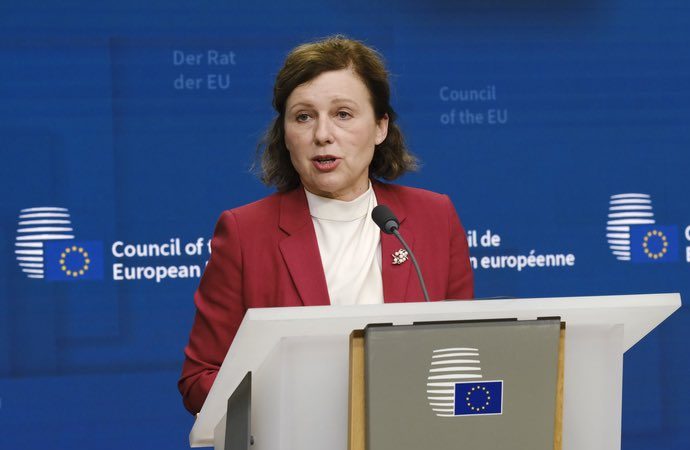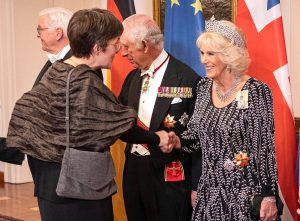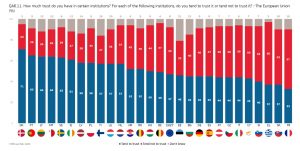
According to Vera Jourová, the Article 7 procedure can be closed once the problems have been resolved and once it is ensured that there is no longer a risk of systematic breaches of EU core values.Continue reading

In the ugly row over the coming 2024 Hungarian presidency of the Council of the European Union, some of the country’s closest historic partners seem to be united in their belief of being in a position to school Budapest over European values. However, they part ways when it comes to respecting the will of Hungarian voters, as well as in terms of accepting their government’s European politics.
The disturbing debate over whether Hungary has the right kind of democratic credentials to take over the rotating presidency of the Council of the European Union has been identified by segments of the Hungarian press as being fanned by the left-leaning majority of the European Parliament. However, a new dimension has been added to the debate when Germany’s Europe Minister Anna Lührmann (Greens) chimed in on the row stating that “I have doubts about the extent to which Hungary will be able to lead a successful Council presidency”. Lührmann had reportedly referred to what she called Hungary’s wavering stance on supporting Ukraine in its struggle against the Russian invasion.

Anna Lührmann (L) during a recent meeting with British royals. Photo: Facebook Anna Lührmann
For a EU government minister to make a direct connection between a EU member-state’s stance on providing direct military assistance to a non-EU and non-NATO country with the EU presidency is a serious leap in interpreting the bloc’s fundamental treaties. However, that the minister accusing the government in Budapest of a wavering stance on Ukraine happens to be a German minister, is all the more surprising, as probably no other government in Europe had wavered more over the issue than that of Olaf Scholz’s. From his early pledge to keep out of the war militarily and sending only helmets, to the ongoing shipment of modern tanks and state-of-the-art missiles to Ukraine, the German position had evolved significantly.
Whether one agrees of disagrees with it, Budapest’s position has been consistent from the very beginning of the war in February 2022: yes to refugees, yes to humanitarian and medical aid, no to weapons shipments, and a conditional yes to sanctions. Minister Lührmann’s skepticism over the Hungarian EU presidency can thus hardly be derived from some kind of inconsistency in Budapest’s stance towards the conflict in Ukraine, but by the fact that she is a Green politician, whose party is one of the most vocal supporters of arming Ukraine, and whose own movement has a fundamentally different vision for the future of Europe than of the Fidesz government’s conservative politicians’.
In contrast, the Austrian EU Affairs Minister Karoline Edtstadler (ÖVP) stated that all member states have equal rights and obligations, including the presidency of the Council, for which Hungary must now prepare. “We have to deal with the rule of law in the framework of the Article 7 procedure or conditionality rules. As for the presidency, it is an opportunity for Hungary to show, and indeed must show, that it is pro-European and capable of promoting common causes not only for its own interests but also for the EU’s interests,” she said.

Photo: Facebook Karoline Edtstadler
Although more measured than her German counterpart’s opinion, Minister Edtstadler probably does not realize just how patronizing it sounds in Budapest and beyond when she calls on Hungarians to actively show that they are pro-European and that they are “capable” of acting in the interests of the EU as a whole, rather than in their own narrow national goals. A quick look at the latest Eurostat survey shows that such statements are not supported by a lack of Hungarians’ commitment to the European project, but by the fact that some politicians, notably in Germany and Austria, are seriously out of sync with public opinion in their own country.

The latest polls show that the EU’s popularity in Hungary is above the European average at 50%, while both Germany and Austria are currently in the bottom third of the table when it comes to sympathies for the European project among voters. Only 45% of Germans tend to trust the EU, and only 44% of Austrians do so. What these numbers tell us is that despite their unbridled and very public enthusiasm for the European project, both governments are not only failing to sell the EU’s values and merits to their own population, but judging from the rhetoric above, they are also failing to give a voice to existing, majority euro-sceptic sentiments prevalent among their citizens. Despite the fact that euro-scepticism has all but disappeared from the products of the German media, and the plurality of opinion is in many respects also seriously under threat in Austria, Hungary with its loud and unambiguous political and media environment still manages to maintain a more europhile populus than some of its Western partners.
A free press critical of certain European institutions and politicians, and a government voicing the concerns of its own citizens, such as the ones in Hungary, should not be regarded as a threat to the European project, rather as a welcome and an essential part of the democratic process. In contrast, to quote the excellent British journalist Sherelle Jacobs, “a system is classed as fatally neurotic when it deems the psychological cost of detaching from the status quo to be too great, even if failure to adapt threatens its own destruction”.
Featured Photo: Pixabay